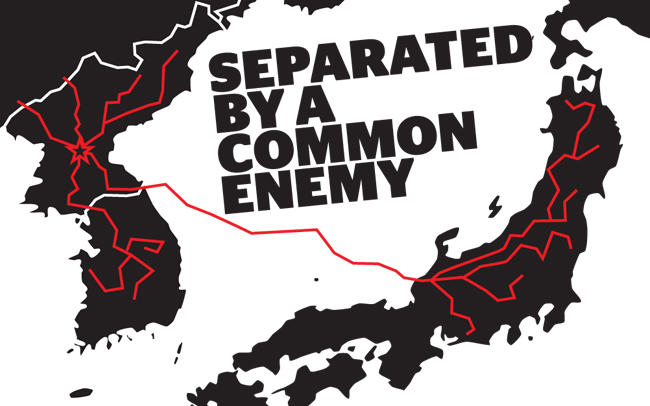Already under consideration before North Korea's nuclear test last week, the LDP's push to include plans for an indigenous capability to strike North Korea to preempt an attack on Japan has picked up speed over the past week. On May 26th, Prime Minister Taro Aso reminded reporters that since 1955 preemptive self-defense has been considered legal. The same day a subcommittee of the defense division of the LDP's Policy Research Council approved a draft of proposals to include in this year's National Defense Program Guidelines (NDPG) that calls for preemptive strike capabilities, especially sea-launched cruise missiles. On the 28th, the prime minister once again asserted the legality of preemptive strikes, this time in proceedings in the Upper House Budget Committee.
In the midst of this debate, Mainichi called for a less passionate debate that acknowledges the risks associated with this step, including the feasibility of preemptive strikes against North Korea, the consequences for the US-Japan alliance, and the dangers of arms racing and security dilemmas in East Asia. I second Mainichi's concerns: there are a number of questions that advocates of preemptive strike capabilities have yet to answer, most notably the question of what independent Japanese strike capabilities add to US capabilities.
It now appears that the US government may be contributing to the debate over Japanese preemptive strike capabilities.
Speaking at the Shangri-La Dialogue in Singapore on Saturday, US Secretary of Defense Robert Gates delivered a message to Japanese and South Korean elites worried about the sturdiness of the US commitment to its East Asian allies:
The Republic of Korea and Japan have since become economic powerhouses with modern, well-trained and equipped armed forces. They are more willing and able to take responsibility for their own defense and assume responsibility for collective security beyond their shores. As a result, we are making adjustments in each country to maintain a posture that is more appropriate to that of a partner, as opposed to a patron. Still, though, a partner fully prepared and able to carry out all – I repeat, all – of our alliance obligations.
This message is ambiguous, welcoming greater allied contributions while reaffirming the US role in defending its allies, especially via extended nuclear deterrence, but Sankei's Yoshisa Komori believes that there is more to the story. The Obama administration, he writes in an ecstatic post at his blog (if two exclamation points are any indication), has signed off on preemptive strike capabilities. His evidence is derived from interviews of Gates and Wallace Gregson, assistant secretary of defense for Asian-Pacific affairs by Asahi's Washington correspondent Yoichi Kato in which both officials appear to accept Japan's having the ability to strike at threats outside its borders. Gates's statement is vague, premised on the notion of "If Japan decides" to acquire more offensive capabilities, i.e. practicing what he has preached about the US being a partner instead of a patron. Gregson, while also reluctant to comment on what is a domestic matter for Japan, was open to a new division of labor between the US and Japan.
I appreciate that the US officials are refraining from overt interference in Japan's internal political discussions, but I think that the US has reasons to be concerned about this shift. (I also think that Komori is fishing for US support for his position. But a pair of quotes in an Asahi article do not a new policy make.)
Apart from the aforementioned reasons for skepticism about Japan's acquiring autonomous strike capabilities, there is another reason why the US should be concerned about this debate in Japan.
Arguably one reason for the difference in US and Japanese approaches to North Korea — apart from geography, the abductees, and domestic politics — is the US alliance with South Korea. Japan's North Korea policy can be conceived solely in terms of Japanese national interests, defending Japanese lives and property from the rogue state next door. The US approach to North Korea is broader. Not only is the US concerned about the threat posed to the US by the possibility of the transfer of nuclear materials, but it is worried to a lesser extent about the durability of the global non-proliferation regime. And it is not only concerned about the threat to Japanese security, but South Korean security as well.
The conflicting demands of the US-South Korea and US-Japan alliances are a source of turbulence in the US-Japan alliance. The US, legally committed to the defense of South Korea, has to think carefully about its words and actions vis-à-vis North Korea — indeed, the US is deterred from launching a preventive and perhaps a preemptive war against North Korea due to the threat posed by North Korean conventional capabilities to Seoul. This lends an air of restraint to US pronouncements on North Korea. As Sam Roggeveen writes, it is possible to read Gates' speech in Singapore as outlining a containment policy in recognition of the considerable obstacles in the way of denuclearization. It also bears recalling the decision by the US government ruling out in advance an attempt to shoot down North Korea's test rocket. That decision has been interpreted by Japanese elites as evidence of the shakiness of the US defense commitment. Maybe so, but it may be more appropriate to view the US not as lacking commitment to Japan's defense but having concerns greater than Japan's defense.
Which is why the US (and South Korea) should be concerned about Japan's acquiring independent preemptive strike capabilities. Japan, not having any alliance relationship with South Korea, will have no reason to take South Korea's security into consideration in confronting North Korea. If the Japanese government detects an imminent launch — with the autonomous surveillance capabilities that conservatives also wanted included in the NDPG — it will be able to act solely on the basis of the direct threat posed by North Korea's missiles to the Japanese homeland. It will not have to consider whether launching a preemptive strike will lead North Korea, fearing a mortal threat to the DPRK regime or perhaps not being able to identify the source of an attack, to lash out against South Korea. Unconstrained by broader regional commitments, Japan could use its new capabilities for "offensive defense" and in the process trigger a broader regional crisis — not out of a lust for conquest, but simply out of a desire to defend itself from an external threat.
This may be an unlikely scenario: after all, it is not clear that the NDPG will include plans for preemptive capabilities, and even if strike capabilities make their way into Japan's defense plans, they may amount to nothing more than a token force. And Japan may not be able to gather the necessary intelligence for attacks against North Korea's mobile launchers.
However unlikely, South Korea ought to reach out to Japan in order to close the gap, in effect forcing Japan to think about broader regional security when it considers the threat posed by North Korea. In other words, it is necessary for South Korea (and the US) to undo the damage done when the Japanese government decided to make recovering the abductees the central goal of Japan's North Korea policy. That decision produced a Japan solipsistic in its approach to North Korea, inclined to view North Korea through its distinct lens, barely considering the perspectives from which other countries have struggled to manage North Korea.
It is encouraging that the US, Japan, and South Korea had their first ever defense ministerial meeting in Singapore Friday. If Japan is to acquire its own strike capabilities, it has to be prepared to wield them responsibly, considering the consequences that saber rattling, to say nothing of preemptive strikes could have for other countries in the region. Regional security and stability is a Japanese national interest, even without formal alliance commitments in East Asia. Realizing that, perhaps Japan's leaders will become more appreciative of US efforts to uphold regional security — especially the defense of South Korea —and less unnerved by US restraint, in turn lessening the need for independent capabilities.
Blog:
Other posts by Tobias Harris:








Comments
Anonymous (not verified)
June 5, 2009 - 15:01
Permalink
Re: Separated by a common enemy
Very well written article.